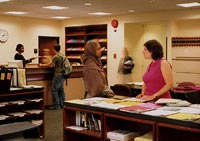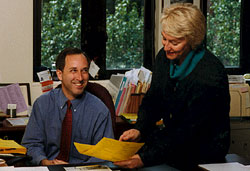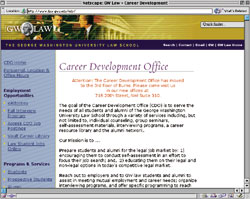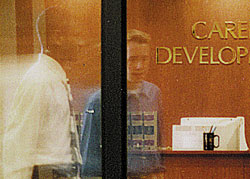|

By Bob Guldin
Photos by William Geiger
The first time you enter the GW Law School’s new Career Development Office, you may be inclined to do a quick double take. Is this a university placement office, you might ask yourself, or has some high-powered law firm taken over the space?
If that’s your reaction, the leadership of the Law School will be very pleased—because that’s just the impression they were hoping to create.
“It’s a very professional presentation, it has the look of a law office,” says Assistant Dean Joan Strand, whose portfolio includes career development. “It sets the right tone, creates the right atmosphere for this endeavor.”
Law School Dean Michael Young elaborates, “The main point in giving the CDO a professional look is not simply to make it attractive, though it does that. It is to create an appropriate environment in which counselors and students can conduct the very important work of career planning.”
Priority for Student Services
The CDO’s handsome new quarters and central location on the third floor of the Burns Law Library did not come about by chance, says Associate Dean for Administrative Affairs Thomas Morrison. They reflect a decision made several years ago to upgrade facilities for student services, including student affairs, computing and career development. “We’re here to take care of students,” he says.
Career development has taken on a particularly high priority. Says Young, “The new spaces and the location and look of the CDO are designed to convey the importance of its mission to our student body.”

Inside the resource library of the Career Development Office
|
The CDO did not always take pride of place. Strand remembers, “I graduated from the Law School here in 1975. At that time we had one person in a small office with a box of index cards—that was the CDO back then.”
Since those dark days, the office has migrated several times. In recent years, it has resided in Old Main on F Street, two blocks from the main Law School complex.
“Even though we were running this huge program, I didn’t see students very often because we were a few blocks away,” says Amy Caster, manager of Law School recruiting. “Now it’s much easier for the students to just drop in. The flow is incredible—it’s a huge benefit.”
Not only is the CDO in a great location now, but also that location will become more central as the Law School expands in the next few years. That’s because the school will be expanding into Stuart and Lisner Halls around the corner on G Street. Explains CDO Director Fred Thrasher, “When the Law School breaks through to its new space, this third floor hallway will be the main connector between the Burns-Stockton-Lerner complex and the new Stuart-Lisner complex.” So students will constantly pass right in front of the CDO’s front door.
Dean Morrison, who is in charge of the redesign and reconstruction of the Law School, says that the magnitude of the school’s upcoming expansion meant an architectural master plan was needed. Morrison called in Cox Graae + Spack Architects, who “have set the tone for this professional law school look,” Morrison says.
Thanks to hard work by the contractors and leadership by Morrison and the faculty building committee, reconstruction of the CDO was able to occur during the last school year. By April 2002, the career counseling staff had moved in.
Lawyers Counseling Lawyers-To-Be
Of course, the outstanding physical facilities would mean little without the people and programs to make the Career Development Office truly useful to students and alumni.
As Young says, “What I’m really excited about is that co-locating the CDO in the midst of student activities and classrooms provides a facility in which students can avail themselves of our terrific counseling staff.”
Co-locating the CDO in the midst of student activities and classrooms provides a facility in which students can avail themselves of our terrific counseling staff.
|
Many alumni will be surprised to learn that all the career counselors at GW Law are themselves attorneys. This is a rising trend at American law schools, and GW is ahead of the curve.
First and foremost, Thrasher, director of the CDO, is a GW law grad himself—JD ’93. After serving as a career counselor at Brooklyn Law and serving as assistant dean at William and Mary Law, he returned to GW in July of 2001.
Thrasher has every reason to appreciate what the GW career office can do: “While I was a student at the Law School, the CDO was the source of all my summer and permanent positions,” he says with a smile. Thrasher also is very active in the National Association for Law Placement, to stay involved with the latest developments in the field.
Associate CDO Director Jim Lovelace specializes in public interest law. Rounding out the professional staff are Sheila Driscoll, Michele Hayes, Suzanne Hill, Carole Montgomery, and Ray Hazen, a 20-year veteran of the counseling wars who works especially with alumni and evening students.
It makes a difference to students that counselors are also attorneys, says Silvia Dominguez, a recent graduate who has used the CDO extensively. “You want to speak to someone who can relate to what you’re going through,” she says. “If they don’t have a JD, it’s not that they won’t work as hard. They can sympathize, but they can’t empathize.”
It’s more than having the credentials, though. Students, recruiters, and the counselors themselves feel that the CDO is staffed with caring, hard-working people. As counselor Hazen puts it, “We have a general office ethic that we’re here to help.”
Jonathan Rotter, a legal recruiter for the Nature Conservancy who often uses the CDO, told GW Law School magazine, “I wish that other schools could be as service-oriented and friendly and responsive as they are at GW.”
Connecting the CDO to the law faculty and the school as a whole is the task of Joan Strand, who oversees the operations of both Career Development and Alumni Affairs. Strand was the president of the D.C. Bar in 2000. “As president of the bar you come into contact with a lot of local firms and individuals,” she says. “And Fred also has wonderful contacts. Between the two of us, if we need a name somewhere, we can come up with it.”
A Smorgasbord of Services
The CDO offers students and alumni an array of services from which to choose. Probably the most high profile—and certainly the most intense—is the fall interview program, which coordinates interviews for GW Law students with more than 350 employers from all over the United States.
The program runs for some six weeks in early fall, with the first week’s activities held at a hotel near campus. “We want students to be able to schedule back-to-back interviews,” says Recruiting Manager Amy Caster. “Some students schedule eight to 10 interviews in one day.”
“The fall program is very important,” says Caster, “with about 45 percent of our students getting their jobs through that program.”
The CDO also conducts regional interview programs in eight cities around the United States, some in cooperation with other schools. GW and Georgetown Law cooperate on a public interest recruiting program held yearly in D.C. And an extended on-campus interview program takes place during spring semester.
Plus, Caster notes, “There are counselors available every day to take walk-ins. There’s the resource library, we do résumé collections, employers post jobs through our office, we put on panel discussions in different practice areas. We sometimes poll the students to find out what they’re looking for.”

Fred Thrasher (l), CDO director, confers with Assistant Dean Joan Strand.
|
In addition, the center conducts workshops on interviewing skills, résumé writing, and networking. Some counselors also are trained to administer personality and interest inventories, to help students decide on career directions.
Most alumni who dealt with the CDO more than a few years ago “are going to remember handing in résumés to the CDO, which in turn parceled them out to legal employers,” says Fred Thrasher. “Now everything is done over the World Wide Web. We use a system called eAttorney. Students upload their résumés and cover letters, bid online, and then we transfer those documents to employers either on hard copy or electronically. For about half the employers we now transfer the materials by clicking a button.” The eAttorney system is available to alumni everywhere (see box).
While the resources offered are abundant, it’s up to the students (and alumni) to make use of them.
Erin Hirsch Josendale, a third-year law student, hasn’t spent much time in the CDO but has used the center’s newsletter, e-mail, and advertised events. At a government career fair she found a summer position in the public defender’s office in Prince George’s County, Md. Through networking, she now has a judicial clerkship in that county lined up for after graduation.
Silvia Dominguez, JD ’01, made frequent use of the CDO. “Every time they moved buildings, I would wander over there and get as much information as I could,” she says.
“The key is finding someone you connect well with,” Dominguez advises. “If you don’t click with one counselor, then try another.” Dominguez found counselor Carole Montgomery to be a great person to work with. “I just love her,” she says.
Dominguez, currently in a judicial clerkship in D.C. Superior Court, also recommends that students get to know the CDO and its resources early. “You have to put in some effort. You can’t expect CDO to say, ‘Oh, here’s your job that’s going to pay $150,000 a year.’ It doesn’t work that way. Good things are hard to get and you have to work hard for them.”
That advice is especially relevant at times like these, when the legal job market is tight. Thrasher calls it “a mild contraction. We’ve seen slight reductions in the number of summer associates employers might be hiring, which ultimately leads to a smaller number of permanent hires post-graduation. Employers who might have had 25 hires last summer will hire only 22 this summer—but that’s the second summer of reductions.”
For students who are having difficulties finding a job, the user-friendly CDO does what Thrasher calls “proactive outreach to those who need assistance. Last year, starting in March, we made special efforts to check Web sites every day to identify entry-level opportunities for the third-year students we knew were still struggling and looking.”
Recruiters’ Delight
Some of the strongest testimonials to the CDO’s effectiveness come from recruiters in Washington—a central constituency for any placement office.
Mary Beal is director of recruitment for Akin Gump, a firm with 13 offices and about 1,000 attorneys. She says that when she’s recruiting, “I always think of GW. I just call Fred and get the postings up and the candidates start coming in. We also look for lateral placements.”
Beal adds, “GW is lucky to have a person like Fred. He’s very helpful, and his staff is great. They’ve got a very smooth operation—you don’t see that everywhere.”
Of course, it doesn’t hurt that so many GW grads are excellent candidates. Says Beal, “This is an enormous feeder school for most of the firms located in Washington. GW has a great caliber of student.”
Jonathan Rotter, who heads the recruiting of clerks for the Nature Conservancy, fills nine positions a year, and he says “better than 30 percent of the students have been from GW, despite the fact that we recruit from all the schools in the D.C. area, plus in the summer we recruit nationally.”
At GW, Jim Lovelace is Rotter’s primary resource. “It’s a function of two things,” he says. “First, the students are very good: We’ve been very pleased with the quality of their work. A close second is that Jim’s team is just very, very helpful. They listen to you, they understand what kind of assistance you need as an employer. Two of the three students in our clerkship program now are from GW.”
With feedback like that, the GW Law Career Development Office seems to be on the right track. And with an attractive, centrally located facility, a growing professional staff, an ethos of caring service and strong support from the Law School’s administration, it would appear that the CDO is geared up to achieve even stronger successes for the students and alumni who rely on its work.
Bob Guldin is a Washington writer and editor.
Alumni Are Always Welcome
 While the preponderance of the Career Development Office’s services go to current students, “alumni can utilize the majority of our services forever and ever,” says Amy Caster, the CDO’s recruitment manager. While the preponderance of the Career Development Office’s services go to current students, “alumni can utilize the majority of our services forever and ever,” says Amy Caster, the CDO’s recruitment manager.
“They can use our job bank—many employers post positions that aren’t just for new grads. They can use the resource library, schedule interviews with counselors, and use eAttorney, our Web-based system,” Caster adds.
Case in point: When Silvia Dominguez, JD ’01, was looking for her next career move after a judicial clerkship, she got in touch with the CDO from off campus. “They were very flexible,” she reports. “I was able to fax them my résumé, they edited it and faxed it back. We talked about it over the phone.”
Probably the service most accessible to alumni is eAttorney. To use this system, contact the CDO, register, and you’ll get the password for alumni. “It gives GW alums access to any and all postings we get for graduated attorneys,” notes CDO Director Fred Thrasher. Alumni also can post résumés and research more than 35,000 legal employers.
For an overview of CDO services, go to www.law.gwu.edu/cdo and click on “alumni.” You’ll find a thorough description of eAttorney on the Web page, too.
For a more personal touch, CDO counselors can consult with GW Law graduates by phone or in person.
Perhaps the best person to talk with is Ray Hazen, who specializes in counseling alumni and evening students. Hazen is at the CDO two evenings a week.
Hazen was director of counseling and associate dean of students at American University’s law school, and has 20 years of experience in advising students. Not quite ready for retirement, he came to GW as a part-time counselor.
Hazen says he often sees alumni “after they’ve have been out for three to five years, who say, ‘I want to move to a different part of the country, or work for a smaller firm or a bigger firm, or I want to go to government, or write movie scripts’—though there’s not too many of those.” Whatever their priorities, Hazen is available with expert advice.
Counseling the Whole Person
 Career counseling can mean anything from simply referring students to information about prospective employers to engaging fully with a person’s emotional, educational and professional needs. Career counseling can mean anything from simply referring students to information about prospective employers to engaging fully with a person’s emotional, educational and professional needs.
At the GW Law Career Development Office, there’s a clear priority on working with the whole person. As Director Fred Thrasher notes, “We’re committed to taking care of students and alumni. We have empathy for people engaged in a very stressful activity.”
A prime example of this approach is Carole Montgomery, an attorney who was in practice for 16 years before becoming a career counselor.
“This is the office where students come in and completely unload, where you hear about the critical illnesses in their family,” Montgomery says. “They don’t have to take quizzes here. We get to know the total person. They tell us things they probably don’t tell anyone else at the Law School, so we can design a job search strategy around whatever it is they’re struggling with.”
Montgomery says that can mean being both a “cheerleader” and a “reality check” for students considering career paths. “I want to keep them motivated, keep their spirits up. But I also have to tell them, ‘I hear what you want to do, but let’s be realistic about the job market.’ ”
Counseling law students can mean giving them tips on the highly competitive interviewing process. “Some students have outstanding experience before law school, so you try to catch an interviewer’s eye, design a résumé around that. Those are tricks of the trade.”
Montgomery also tries to steer students and alumni toward jobs that make sense for them. For example, a student who has young children and wants to spend time with them may not be a good match for “a large law firm that offers six-figure starting salaries, but which requires 2,000 billable hours a year. That means a 60 or 70 hour week.”
Montgomery concludes, “I love coming to work every day. I love the students. I want everybody who walks out my door to feel better than they did coming in.”
Back to top | Fall 2002 Table of Contents
|